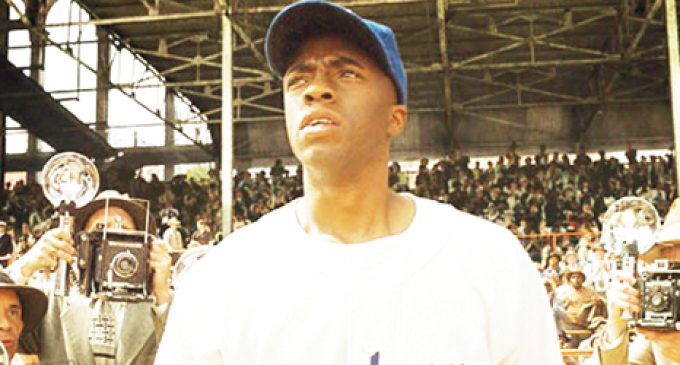“42” is America’s Story

“42” – cuarenta y dos in Spanish – is the story of Jackie Robinson, Major League Baseball’s first black player. There are some significant changes in his beloved game that are also reflected – and are magnified – in his beloved country, which he pressed hard to live up to its creed. Had Mr. Robinson been around at the private showing of his biopic at the White House last week or for a greeting at most any MLB stadium during Jackie Robinson Day, April 15, when all players wear number 42, he might likely have hailed many of the game’s best and highest-paid players in Spanish, “Bienveindos hermanos!” Welcome brothers!
Mr. Robinson, chosen to be “the first” in part because he was an exceptionally intelligent and articulate man with a degree from UCLA, might note that the current baseball season opened with the smallest percentage of black players since he suited up for the Brooklyn Dodgers in 1947. Now – sixty six years later – aficionados to the Great American Pastime welcomed the largest percentage of Latino players ever.
What does 42 – both the number worn by Jackie Robinson and the latest biopic about him – have in common with several other numbers, er, make that números?
On the hardball side of things, the números of the baseball players of Robinson’s breed, shall we say, have dropped precipitously since he died in 1972. The percentage of guys in MLB with last names like Guerrero, Ramírez, Ortiz, Martínez and Rodreguiz exceder en numero (outnumber) players with names like Hank Aaron, Ernie Banks, Roy Campanella, Joe Morgan, Willie Mays, Willie McCovey and Satchel Paige.
When the San Francisco Giants faced the Detroit Tigers last year in the World Series, the combined rosters had 22 Latino players. At their celebration, the Giants featured, naturally, Giants Hall of Famer Orlando Cepeda and Rock and Roll legend Carlos Santana. There are no black players on the Giants roster this year; same for MLB teams in St. Louis, Seattle, and the Texas Rangers.
Just by looking at these numbers – not to mention the enthusiasm of Latinos for the game, the impact of Latinos is strong, and growing. Like the fleet-footed Robinson, the numbers of Latinos will soon “change the game,” so to speak, in America itself.
According to the U.S. Census Bureau, in the next year that ends in Robinson’s number (2042), in the next generation, non-Hispanic whites will lose their majority. If the American experience along the color lines – as it was between the lines of a baseball field – is any indication, there awaits a very uncertain, if not a problematic future, a backlash, when it comes to the combination of the current wave of Latino immigrants and the high birth rate of American citizens of Latino ancestry. Researchers from Stanford University reported two years ago that “a slight majority of whites expressed racial bias against Latinos and that their attitudes were similar to or even greater than the bias they held towards blacks.”
As Mr. Robinson’s entry into MLB was a great challenge, so goes the projections of the American off-white experience. One thing is for sure – as we watch the numbers change in America’s Greatest Pastime and in the population shifts in the country as a whole, as we buy our popcorn and Cracker Jack – we surely will never go back. In racial and ethnic terms, America is going to be a whole new game, in 2042, as it is now in el beisbol.
William H. Turner writes freelance pieces from Houston, Texas. Contact him at bill-turner@comcast.com.











